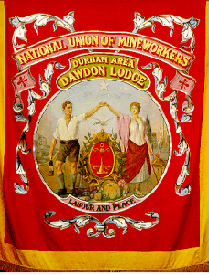Thomas McLauchlan (1888-1979): Life and Labour (part 2)
In this second section of the Life and Labour blog, we will be exploring Thomas’s other work responsibilities outside of the mining industry. Over his long working career, Thomas not only held down a gruelling career working in the mines, but also had responsibilities within his local Methodist group. Throughout this period of 50 years, Thomas discusses the hardships and exploits he faced whilst working within these two pillars that dominated his working life, all the while having to support his wife and children. He discusses political turbulence, which I will discuss further in a later post on Politics and Beliefs, and how this affected the many organisations he was involved in, giving us a fascinating first hand insight into the struggles the working class man had to deal with in the early twentieth century. However, what strikes me about Thomas, is his innate ability to stay optimistic. Although mentioning the hardships he faced, he seemed to conquer these with a pro active approach to life and work that seemed to alleviate the pressures of the working man. Perhaps this was born from his desire to help others (he mentions how he was inspired by many leaders within the Church who late

r he found had a passion for socialism). Or maybe it was simply to give his wife and children the best life and future possible. Either way, he writes of this fondly, stating “Little did I think it was the beginning of above fifty and more years of many experiences I had never dreamed of. It is a blessing that nobody can predict the future course of their lives” (9)
Thomas’s life as a Methodist lay preacher began when he moved from the mining village he grew up in to Dawdon in 1910, another mining village that lay in the south Durham. The move resulted in a change of work surroundings for Thomas, and he writes about how at the very beginning of his time there, it was extremely difficult to make ends meet. “When we went underground to work it was stranger still. For the first six weeks we wondered why we had come because the area we had to work was hopeless. The seam of coal was very hard to work and the money we made was very poor.” (9) However, things soon began to look up.
After beginning to attend the new Methodist church developing in Dawdon, Thomas began to circulate within a collective of local preachers and attend church related events that would result in having a profound influence on him. In 1912, within two years of moving, he too would become a local preacher. Over his time preaching, Thomas would travel the length and breadth of the country and hold positions in many different organisations within the Methodist church. He writes enthusiastically of his travels, noting down and describing encounters that have stayed with him over the years. One particular encounter I found very touching, involved a sermon Thomas led in Newcastle. He often discusses how his sermons often came to him in “all sorts of ways in bed, as I walked down the street, in the mine”(20). For this particular sermon, Thomas found inspiration whilst the congregation were singing a hymn. “As they were singing I opened the Bible and my eyes fell upon these words, ‘I call you no longer disciples but friends’” (20) Later, Thomas writes how he was walking the dog one day and a man approached who he vaguely recognised. “Suddenly he said can you remember the sermon that you preached years ago at out church. Then he quoted some things I said in the sermon. He said that he never forgot and he tried to live by them. Those words are too good to lose.” (20)
In 1926, Thomas was appointed on the Executive of the Durham County Rechabites of which he became chair in 1930. He was the youngest man to have filled the office. Over his time within the society, and as chair, he travelled throughout the country and spent many weekends away from home. He interestingly writes of a fascinating weekend he spent in Nottingham attending a High Movable Conference with his wife Polly. “I preached in a very large Methodist church where I was shown relics handed down by John Wesley” (23). This must have been fascinating. Over this period of around fifty years preaching up and down the country, Thomas writes that he must have lead around “one to two thousand sermons”(23).
The sheer amount of work responsibilities Thomas undertook throughout his life is admirable. Throughout his time as a miner, teacher and preacher, Thomas will no doubt have had profound influence on many individuals lives. I believe through his memoir, he will continue to do so.
Bibliography
Gagnier, Regenia. ‘Working-Class Autobiography, Subjectivity, and Gender.’ Victorian Studies 30.3 (1987): 335-363
Mike Savage, Social Class in the 21st Century (Pelican)
Rose, Jonathan, ‘Rereading the English Common Reader: A Preface to a History of Audiences.’ Journal of the History of Ideas. 1 (1992): 47-70
McLaughlin, Thomas, The Life of an Ordinary Man, 1979, Burnett Archive of Working Class Autobiographies, University of Brunel Library, Special Collection, 1.475

Leave a Reply